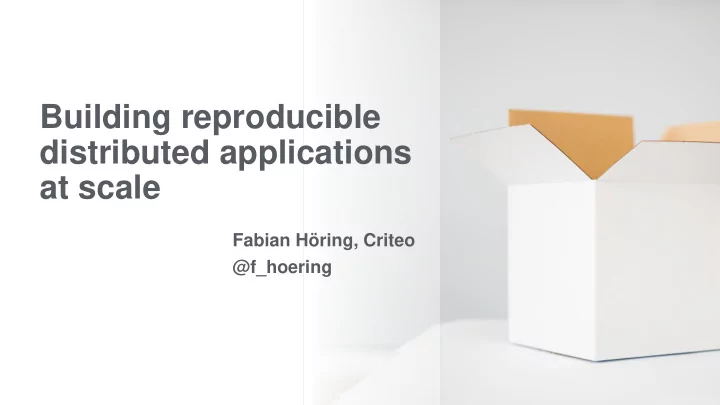

Building reproducible distributed applications at scale Fabian Höring, Criteo @f_hoering
The machine learning platform at Criteo
Run a PySpark job on the cluster
PySpark example with Pandas UDF df = spark.createDataFrame( [(1, 1.0), (1, 2.0), (2, 3.0), (2, 5.0), (2, 10.0)], ("id", "v")) def mean_fn(v: pd.Series) -> float: return v.mean() mean_udf = pandas_udf(mean_fn, "double", PandasUDFType.GROUPED_AGG) df.groupby("id").agg(mean_udf(df['v'])).toPandas()
Running with a local spark session (venv) [f.horing]$ pyspark --master=local[1] --deploy-mode=client >>> .. >>> df.groupby("id").agg( mean_udf(df['v'])).toPandas() id mean_fn(v) 0 1 1.5 1 2 6.0 >>>
Running on Apache YARN (venv) [f.horing]$ pyspark --master=yarn --deploy-mode=client >>> .. >>> df.groupby("id").agg( mean_udf(df['v'])).toPandas()
[Stage 1:> (0 + 2) / 200]20/07/13 13:17:14 WARN scheduler.TaskSetManager: Lost task 128.0 in stage 1.2 (TID 32, 48-df-37-48-f8-40.am6.hpc.criteo.prod, executor 4): org.apache.spark.api.python.PythonException: Traceback (most recent call last): File "/hdfs/uuid/75495b8a-bbfe-41fb-913a- 330ff6132ddd/yarn/data/usercache/f.horing/appcache/applicatio n_1592396047777_3446783/container_e189_1592396047777_3446783_ 01_000005/pyspark.zip/pyspark/sql/types.py", line 1585, in to_arrow_type import pyarrow as pa ModuleNotFoundError: No module named 'pyarrow'
Running code on a cluster installed globally
We want to launch a new application with another version of Spark
https://xkcd.com/1987/
Running code on a cluster installed in a Virtual Env
A new version of Spark is released (env) [f.horing]$ pip install pyspark Looking in indexes: http://build- nexus.prod.crto.in/repository/pypi/simple Collecting pyspark Downloading http://build- nexus.prod.crto.in/repository/pypi/files.pythonhosted.org/ht tps/packages/8e/b0/bf9020b56492281b9c9d8aae8f44ff51e1bc91b3e f5a884385cb4e389a40/ pyspark-3.0.0.tar.gz (204.7 MB)
File "/mnt/resource/hadoop/yarn/local/usercache/livy/appcache/app lication_XXX/container_XXX/virtualenv_application_XXX/lib/ python3.5/site- packages/pip/_vendor/lockfile/linklockfile.py", line 31, in acquire os.link(self.unique_name, self.lock_file) FileExistsError: [Errno 17] File exists: '/home/yarn/XXXXXXXX-XXXXXXXX' -> '/home/yarn/selfcheck.json.lock' From SPARK-13587 - Support virtualenv in PySpark
Building reproducible distributed applications at scale
One Machine Learning model is learned with several TB of Data
1000s of jobs are launched every day with Spark, TensorFlow and Dask
Building reproducible distributed applications at scale
Non determinism in Machine Learning Initialization of layer weights Dataset shuffling Randomness in hidden layers: Dropout Updates to ML frameworks & libraries
We somehow need to ship the whole environment and then reuse it …
We could use
Using conda virtual envs
We use our own internal private PyPi package repository
Problems with using conda & pip “ Use pip only after conda Recreate the environment if changes are needed Use conda environments for isolation.” https://www.anaconda.com/blog/using-pip- in-a-conda-environment
Problems with using conda & pip (venv) [f.horing] ~/$ pip install numpy (venv) [f.horing] ~/$ conda install numpy (venv) [f.horing] ~/$ conda list # packages in environment at /home/f.horing/.criteo-conda/envs/venv: ... mkl 2020.1 217 mkl-service 2.3.0 py36he904b0f_0 mkl_fft 1.1.0 py36h23d657b_0 mkl_random 1.1.1 py36h0573a6f_0 ncurses 6.2 he6710b0_1 numpy 1.19.0 pypi_0 pypi numpy-base 1.18.5 py36hde5b4d6_0 ..
“ At Criteo we use & deploy our Data Science libraries with Python standard tools (wheels, pip, virtual envs) without using the Anaconda distribution.”
Using Python virtual envs
What is PEX ? A library and tool for generating .pex (Python EXecutable) files a self executable zip file specified in of PEP-441 #!/usr/bin/env python3 # Python application packed with pex (binary contents of archive)
Using PEX
Creating the PEX package (pex_env) [f.horing]$ pex pandas pyarrow==0.14.1 pyspark==2.4.4 -o myarchive.pex (pex_env) [f.horing]$ deactivate [f.horing]$ ./myarchive.pex Python 3.6.6 (default, Jan 26 2019, 16:53:05) (InteractiveConsole) >>> import pyarrow >>>
How to launch the pex on the Spark executors ? $ export PYSPARK_PYTHON=./myarchive.pex $ pyspark \ --master yarn --deploy-mode client \ --files myarchive.pex >>> .. >>> df.groupby("id").agg( mean_udf(df['v'])).toPandas()
From spark-submit to Session.builder def spark_session_builder(archive): os.environ['PYSPARK_PYTHON'] = \ './' + archive.split('/')[-1] builder = SparkSession.builder .master("yarn") \ .config("spark.yarn.dist.files", f"{archive}") return builder.getOrCreate()
Repackaging Spark code into a function import pandas as pd def mean_fn(v: pd.Series) -> float: return v.mean() def group_by_id_mean(df): mean_udf = pandas_udf(mean_fn, ..) return df.groupby("id").agg( mean_udf(df['v'])).toPandas())
Python api to build & upload pex def upload_env(path): # create pex and upload return archive
Putting everything to curr_package.main.py archive = upload_env() spark = spark_session_builder(archive) df = spark.createDataFrame( [(1, 1.0), (1, 2.0), ..], ("id", "v")) group_by_id_mean(df)
Running main (venv) [f.horing]$ cd curr_package (venv) [f.horing]$ pip install . (venv) [f.horing]$ python – m curr_package.main ..
Using curr_package.main
Creating the full package all the time is reproducable but slow (pex_env) [f.horing]$ time pex curr_package pandas pyarrow pyspark==2.4.4 -o myarchive.pex real 1m4.217s user 0m43.329s sys 0m6.997s
Separating code under development and dependencies
Pickling with cloudpickle
This is how PySpark ships the functions def mean_fn(v: pd.Series) -> float: return v.mean() mean_udf = pandas_udf(mean_fn, ..) df.groupby("id").agg( mean_udf (df['v'])).toPandas()
Factorized code won’t be pickled from my_package import main df.groupby("id").agg( main.mean_udf (df['v'])).toPandas()
Caching the dependencies on distributed storage
Uploading the current package as zip file def spark_session_builder(archive): # upload all but curr_package archive = upload_env() spark = spark_session_builder(archive) spark.sparkContext.addPyFile( zip_path("./curr_package")) return spark
Pip editable mode (venv) [f.horing]$ pip – e curr_package (venv) [f.horing]$ pip list Package Version Location curr_package 0.0.1 /home/f.horing/curr_package pandas 1.0.0 ..
Uploading the current package
Caching the dependencies on distributed storage
How to upload to S3 storage ? >>> s3 = S3FileSystem(anon=False) >>> with s3.open( "s3://mybucket/myarchive.pex", "wb") as dest: ... with open("myarchive.pex", "rb") as source ... while True: out = source.read(chunk) if len(out) == 0: break target.write(out)
Listing the uploaded files on S3 >>> s3 = S3FileSystem(anon=False) >>> s3.ls("s3://my-bucket/") ['myarchive.txt']
How to connect Spark to S3 ? def add_s3_params(builder): builder.config( "spark.hadoop.fs.s3a.impl", "org.apache.hadoop.fs.s3a.S3AFileSystem") builder.config( "spark.hadoop.fs.s3a.path.style.access", "true")
Uploading the zipped current code archive = upload_env( "s3://mybucket/myarchive.pex") builder = spark_session_builder( archive ) add_s3_params(builder) spark = builder.getOrCreate() … group_by_id_mean(df)
Using Filesystem Spec a generic FS interface in Python
The same example with cluster-pack
import cluster_pack archive = cluster_pack.upload_env( package_path="s3://test/envs/myenv.pex")
from pyspark.sql import SparkSession from cluster_pack.spark \ import spark_config_builder as scb builder = SparkSession.builder scb.add_s3_params( builder, s3_args)
scb.add_packaged_environment( builder, archive) scb.add_editable_requirements( builder) spark = builder.getOrCreate()
df = spark.createDataFrame( [(1, 1.0), (1, 2.0), (2, 3.0), ..], ("id", "v")) def mean_fn(v: pd.Series) -> float: return v.mean() mean_udf = pandas_udf(mean_fn, ..) df.groupby("id").agg(mean_udf(df['v'])).toPandas()
What about conda ? import cluster_pack cluster_pack.upload_env( package_path="s3://test/envs/myenv.pex", packer = packaging.CONDA_PACKER )
Running TensorFlow jobs
Recommend
More recommend